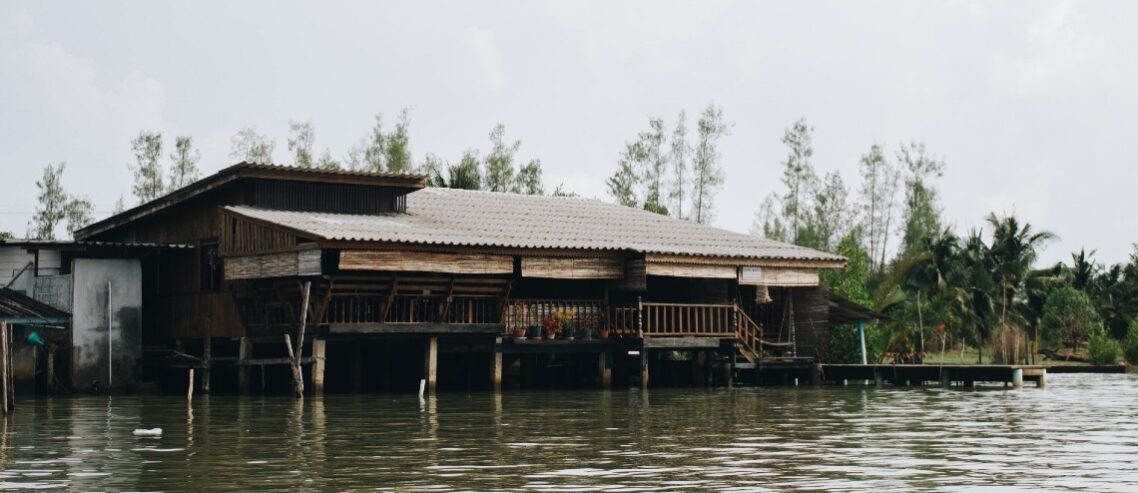7 ways to flood proof your home
Every year, flooding is a massive problem for Thailand – especially during the rainy season between July and October. With Typhoon Noru sweeping in from Vietnam and the Philippines this week, heavy rains have made the flooding problem worse. Houses that are low-lying, poorly built, or located in hard-hit areas are more vulnerable than others, and risk damage to the exterior, interior, and valuable belongings like T.V and kitchen appliances. If you too are worried about the impact of flooding on your home, this Pacific Prime Thailand article gives you 7 ways to flood proof it.
1. Check pipes regularly, and fix leaks immediately
When it rains like cats and dogs, the water can easily seep into your home through the roof or leaky pipes, so you need to keep an eye on any weak spots that form on the ceiling and pooling water in the basement (if you have one). Remember to check your pipes on a regular basis and tackle problems like rust, water droplets, and buckling immediately. Needless to say, any leaks found should also be dealt with as soon as possible.
2. Make rain gutter maintenance part of your routine
Oftentimes, we’re too focused on maintaining the house itself that we forget about the areas in and around it. Rain gutters – in particular, often get overlooked. But these bad boys can easily get clogged with downspouts, causing water to pool and back up around your house’s foundation. A good rain gutter maintenance routine involves removing leaves from gutters and adding leaf guards to keep debris from pilling up.
Pro tip: Need an extra layer of protection? Consider adding downspout extenders that can direct water up to 10 feet away from your house.
3. Install window well covers to protect basement windows
Window wells in the basement are notorious for trapping rain and groundwater. So regardless of whether your windows are old or new, you should consider installing window well covers to give them an added layer of protection. After all, the installation process is fairly inexpensive and simple, and you could always choose clear acrylic covers and still get plenty of natural light in.
4. Angle the soil surrounding your home correctly
Did you know that the soil surrounding your home plays an important role in making sure that water flows away from your house rather than directly to it? The soil should angle away from the foundation and towards the yard at a slope of at least one-quarter inch per foot, which you can ensure by checking the grade of your surrounding soil and adding any extra soil as required to achieve the desired slope.
5. Repair foundation cracks to strengthen the structure
Water can seep in through foundation cracks, which not only leads to flooding but also weakens the structure of your home. Although cracking is a normal part of the wear and tear, repairing cracks is a good idea to prevent major issues further down the line. Use a concrete patching paste to fill in small cracks or, for bigger problems, call an expert to evaluate any damage and suggest appropriate solutions.
6. Move valuables to the second floor of the house
As precautions can only go so far, having a backup plan is sensible. In the event of a major flooding warning and the possibility that water does come into your house, what valuables do you want to keep out of harm’s way? Consider keeping them raised by at least a couple of inches or move them to the second floor of your house for added peace of mind. Think about things like TV, appliances, and more.
Pro tip: If you’ve got a car, consider finding a temporary parking solution in a building during the rainy seasons. This way, you don’t have to worry about your car getting damaged.
7. Secure home insurance to put your mind at ease
Moving things around requires a lot of effort. Another thing you can do to put your mind at ease is to secure a good home insurance plan, also known as homeowners’ insurance.This type of insurance is designed to protect both the structure of your house and the contents inside it in the event of natural disasters (such as flooding and fire), accidental damage, burglary and theft, and more.
Pro tip: You can also look into accidental death & dismemberment insurance to ensure your family finances are secure should you be in an accident – whether flood related or not.
Contact Pacific Prime Thailand for all things insurance!
Pacific Prime Thailand is a global health insurance brokerage and employee benefits specialist with over two decades of experience helping individuals, families, and businesses find the right insurance solutions for their needs and budget. We’ve got knowledgeable and friendly insurance advisors on hand who can give you impartial advice, a tailored plan comparison, and support throughout your insurance journey.
- An Overview of Thailand’s Medical Tourism Industry - September 20, 2023
- How to Open a Bank Account in Thailand in 2023 - August 25, 2023
- Thailand Has One of the Highest Suicide Rates in the Region - August 7, 2023

Comments
Comments for this post are closed.
We'll notify you
when our team replies!